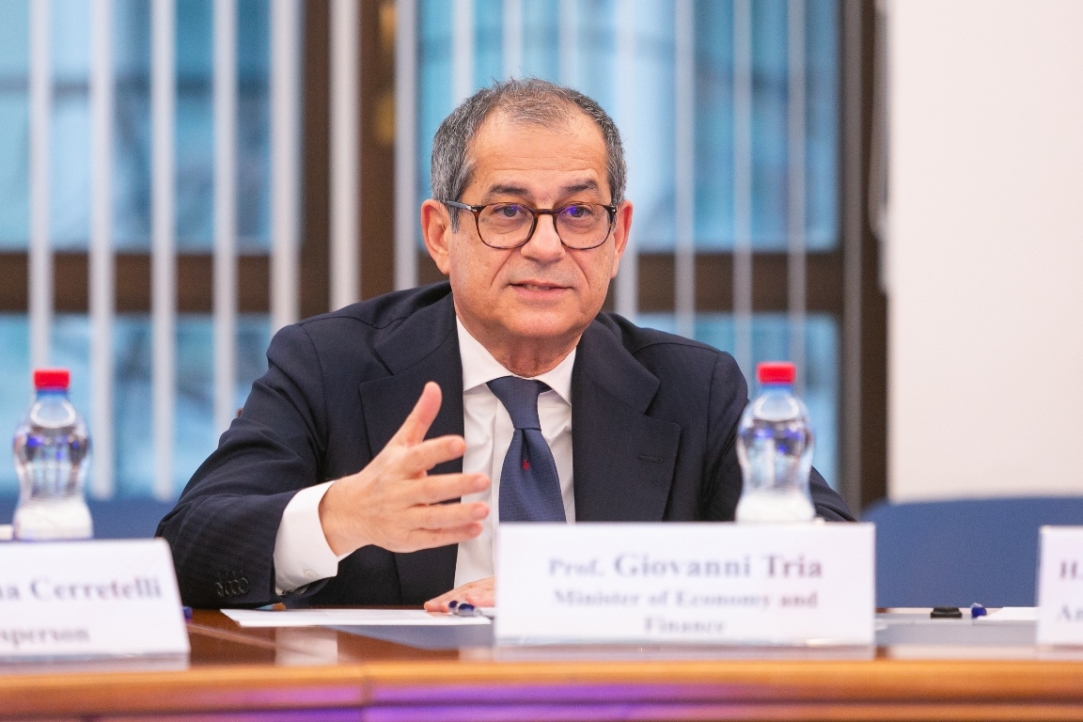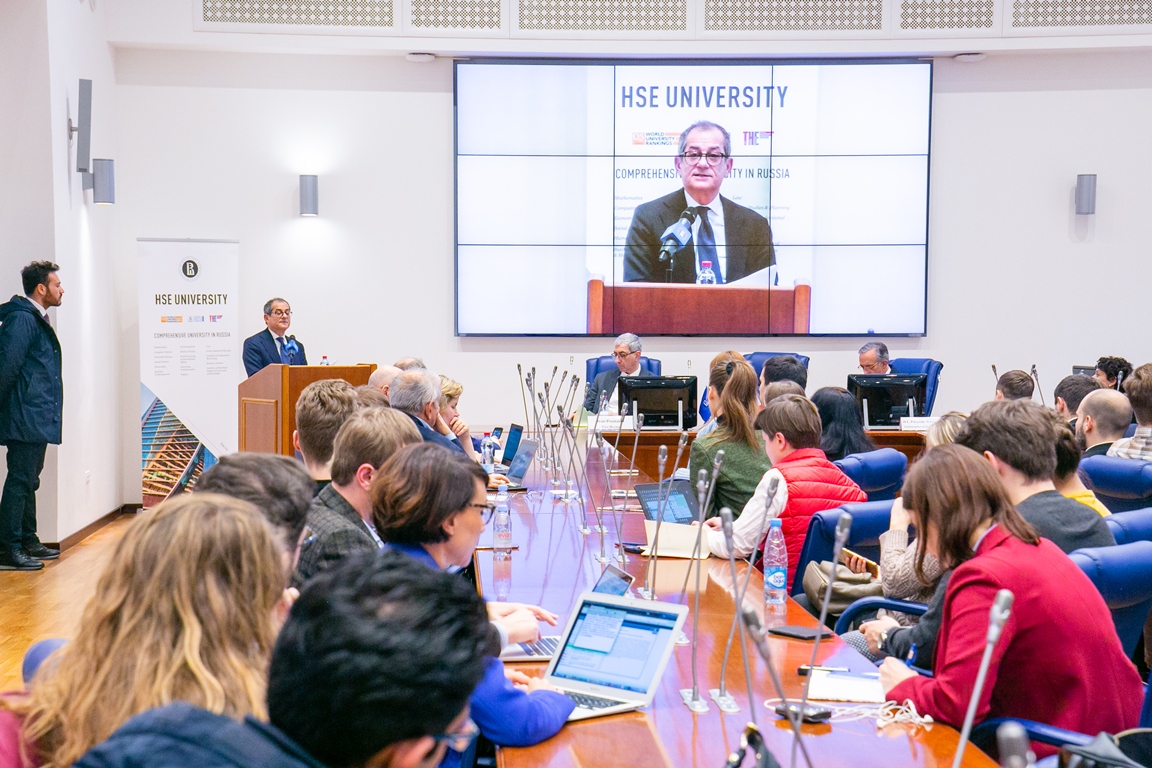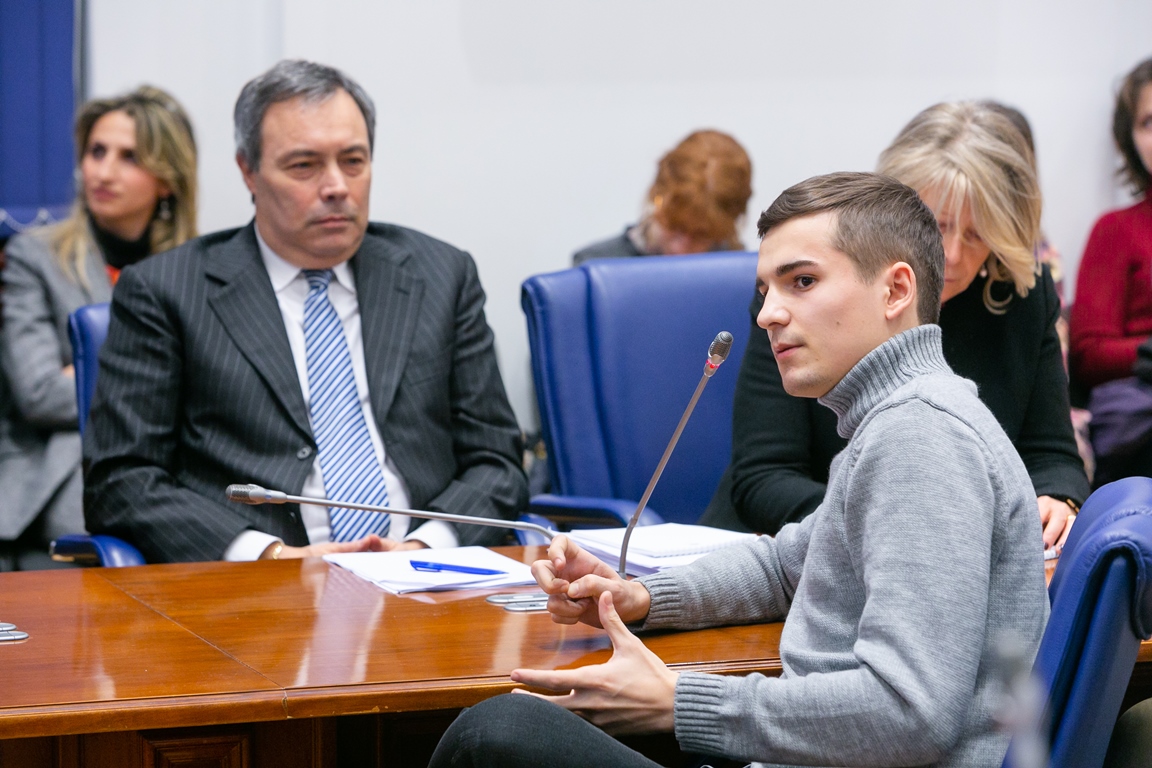There Is No Way Back from Globalization, So We Must Learn to Trust Each Other

On January 14, 2019, Professor Giovanni Tria spoke at HSE on contemporary globalization, including its consequences and problems. Below are the key highlights of his talk.
How We Look at Globalization
In its contemporary form, globalization is a phenomenon of progressive economic, political and cultural integration, driven by economic growth and technological development. Neo-liberal approaches would see it as a consequence of free international markets and freedom from invasive government activities.
I would suggest framing globalization differently, since it is not necessarily friendlier to markets than to governments. Globalization can be seen as a form of self-organized structure that is complementary to the markets and that aims to integrate the world’s ability to provide global public goods. Public goods include, among other things, global public health, world peace, global security, respect for fundamental human dignity, harmonized transportation and communication networks beyond borders, information and knowledge, and institutional global infrastructure.
If we interpret globalization as a process of network creation, we should expect a much more fluid and unpredictable process than traditional international trade development. However, this process is neither uniform in time nor equally spread across countries, social groups and individuals. These differences tend to create inequalities, but they also lead to creative destruction since new connections tend to destroy and substitute the old ones in density, number and location.
From Strong Ties to Weak Ones
In a globalized, fluid network, connections between different clusters are defined by a smaller set of common practices, in some cases even by only one single common standard, for example, a common language. Such connections are called ‘weak ties.’ Greater connectivity also implies that weak ties tend to become increasingly dominant, as growth and preferential attachment will increasingly favour local networks that are more highly connected globally.
But the domination of weak ties leads to a global system that is looser, less resilient to shocks, and prone to rapid shifts. Weak ties forming the global networks are more effective in carrying information over long distances, but they are not necessarily more reliable. In that sense, the exploding phenomenon of fake news is a good example.

Giovanni Tria, Minister of Economy and Finance of Italy
© Mikhail Dmitriev/ Higher School of Economics
Undesirable Effects of Globalization
The first undesirable effect is the loss of trust in Institutions, both at local and global level. One of the reasons for this is that weak ties substitute the more institutionalized mechanisms of cooperation. In addition, there is disillusionment related to failed expectations from globalization, which breaks the traditional ties with no benefit for the people.
The second unintended consequence of contemporary globalization is the decline in investment. This decrease has occurred at national level, but its moderate increase at the global level has not been enough to offset the overall decline. Investment in infrastructure, in particular, has been declining globally, which seems to go hand in hand with declining growth with some common features all over the world. For example, investment in infrastructure in the EU today is at 1.8% of GDP. This is 20% below pre- 2007-2008 crisis levels, and 2.5 times lower than the annual infrastructure investment needs for energy, transport, water and sanitation, and telecoms, according to the European Investment Bank.
In addition, the popular hypothesis that the contribution of the creative component of innovation, productivity and employment to GDP is much bigger than the effect of the destructive component, at least in the long run, is being seriously challenged. Both the negative effects of the destructive component of innovation and the social and economic costs of innovation in products and processes are growing.

© Mikhail Dmitriev/ Higher School of Economics
A Way Forward
With all the problems and difficulties related to globalization, a return to the old models of international interaction is neither feasible nor desirable, because the instruments, policies and institutions of the past are not able to deal with the levels of connectivity that we experience today – or with its consequences. We feel a bit like we are in a trap, and we are looking for a way out. I do believe that trust is the key factor to look for a way out of this trap.
The recent process of adoption of the Italian Budget in the framework of the current European fiscal rules is a good example of the limits of the current legal, political and economic architecture of the EU. What the Italian government is doing today with our economic policy and expansive fiscal policy is very simple. We try to respond to the will of our fellow citizens to emerge from the path that the economic and financial crisis designed for us. What we have decided is to support the temporary losers of this globalization game at the local level in order to find new job opportunities. And we have made a big push for investments to create conditions for growth.
But we have to address rules that were agreed to at the EU level ten years ago when everything seemed to be falling apart with the financial crisis. These rules seemed to work during sustained periods of growth, but they do not address the current situation of a fast slowdown in Europe’s economies, and they do not look at the bigger picture.
I am not suggesting that we should not have rules, but I am noting that technicalities of economic policy should not be given the same political weight as fundamental reasons to cooperate among nations. We will never re-build trust like this. To rebuild trust, we need to look at why we are together, and after that, we have to see if the technical rules still correspond to the current state of affairs.
The path that I believe is necessary to follow to get out of the trap and to re-build trust as the basic foundation of globalization is to rebalance national interest within, and not at the expense of globalization or multilateral cooperation. Will this be an easy path? Absolutely not. It will be a lengthy and difficult process, but it is still a more confident outlook than the gloomy picture of a self-destructive system.
Although Giovanni Tria took up the position of Italy’s Minister of Economy and Finance in June 2018, he is also a well-known academic, serving as Professor and Dean of the Faculty of Economics at the University of Rome Tor Vergata (an HSE partner university, with which HSE has a double degree agreement). Professor Tria has acted as advisor to various Italian ministries and served as member of the Board of Directors of the International Labour Organization. One of the key areas of his research is globalization.
See also:
‘Russia Is a Land of Openness and Possibility’
Lorenzo Trufolo graduated from Bologna University and is studying in the HSE International Preparatory Year ahead of his master’s studies in international trade at HSE University. In his interview, he talks about his studies in Russia, participation in academic conferences and competitions, and the challenges of living in Moscow.
‘I Have Felt Welcomed Since the Very First Day’
Yohei Shiiba from Japan, Eunsong Gu from the Republic of Korea, together with Luca Volponi and Nicola Bressan from Italy shared their impressions of living in Moscow and studying on the English-taught Master of International Business (MIB) programme, which is open to students from all over the world.
Pursuing a PhD in Russia: ‘Attractive and Exotic’
After getting his Master’s degree in Computer Science in Rome, Julio Carrasquel decided not to pursue a corporate career in IT, but to move to Moscow to get a PhD at HSE University. As a result, he received a scholarship on the Advanced Doctoral Programme, successfully defended his thesis, and was named one of the university’s Best Teachers. Julio talked with the HSE News Service about his path in academia and life in Russia.
'Studying and Living in Russia is so Enriching, Fun and Interesting'
Under an agreement between HSE University-St Petersburg and the University of Trento (UniTrento), students of the Master’s programme 'Modern Social Analysis' can participate in a double degree track. Cecilia Brazioli, from Italy, is a participant of the track who shared her impressions of studying in Russia.
From Italy to HSE University-St Petersburg: A Master's Student on Her Education Experience in Russia
Giordana Carbone, student of the Master's programme 'Russian Literature in Cross-cultural and Intermedial Perspective', shares her impressions of her first year at HSE University-St-Petersburg. She explains the difference between European and Russian teaching styles, what pitfalls international students might encounter, and how to adjust to the education tempo of HSE University.
Pivot to the East: A Comprehensive Study of the Cultural and Civilisational Centres of the Non-Western World is the Top Priority
China and the Chinese world, South Asia, Southeast Asia, the Arab countries, Iran, Turkey, Central Asia and Africa are gaining new significance in Russia’s foreign policy. However, we do not know enough about the Eastern countries. It is necessary to change the priorities in education, starting from grammar school. Prospects for the development of domestic Oriental studies in the context of the new stage in the development of the system of international relations were discussed at a round table at HSE University.
‘I Admire HSE Students’ Eagerness to Learn, to Discuss, to Broaden Their Perspectives’
Robert Romanowski was a ‘Digital Professor’ at HSE University in November 2021. In his interview for the HSE News Service, he talked about the specifics of online teaching, his course on Strategic Branding, and the skills that are essential for marketing professionals today.
Russia and Africa: Time to Expand Cooperation
There is major potential for economic and humanitarian cooperation between Russia and African countries. Particularly, Russian organisations and universities can help transfer competencies and knowledge in the fields of agriculture, energy, industrial production, environmental management, climate change, and public administration. Experts and representatives of African embassies in Russia discussed these issues at the round table ‘Russia-Africa Sharing Knowledge’ hosted by HSE University.
The Brain in Space: Investigating the Effects of Long Spaceflights on Space Travellers
As part of an international project conducted with the participation of Roscosmos and the European Space Agency, a team of researchers used differential tractography to analyse dMRI scans ofcosmonauts’ brains and found significant changes in brain connectivity, with some of the changes persisting after seven months back on Earth. The paper is published in Frontiers in Neural Circuits.
HSE University-Perm and the Training Centre of the Uzbek Ministry of Finance Sign Cooperation Agreement
HSE University in Perm has become the first academic partner of the Training Centre under the Ministry of Finance of the Republic of Uzbekistan. The parties have signed a cooperation agreement in education and research.


